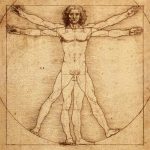Medicine in the Renaissance
The Renaissance was a period of great change and innovation. The arts and culture flourished and a large number of doctors and artists took a great interest in the human body. From the likes of Leonardo da Vinci through to lesser known doctors, there is a wealth of evidence of interest, exploration and experimentation at the time. Technological change also impacted on medicine in the Renaissance and after. The culture shock that was the renaissance led to several huge breakthroughs, though much remained very much the same.
The Renaissance was a period of ‘re-birth’. An era where tradition was challenged and numerous new ideas formed. This affected society in numerous ways and has had a lasted impact. The Renaissance saw the invention of the printing press, in Germany. This invention had a massive impact on medicine and allowed the anatomists of the age, such as Vesalius, to have their work mass produced and distributed. The impact on learning was immense.
Technologies
The renaissance also saw new technologies emerge. Look at the drawings of Leonardo da Vinci to see how revolutionary some of the ideas of the time were. Technology impacted on numerous areas of everyday life, consequently affecting health and treatments. Warfare developed, new weapons emerged and subsequently new treatments were required. In a time of innovation, challenges to the old order and invention, experimentation and risk became more common. While dangerous, it led to huge improvements in knowledge, though not necessarily to treatments.
Medicine in the Renaissance
| Andreas Vesalius |
Andreas Vesalius
The illustrations and research of Vesalius are incredibly detailed and accurate. Learn about his methods and the impact of his work here. An anatomist, Vesalius’ work led to an improved understanding of what the inside of the human body looked like. He challenged accepted norms. However, his work did not have an instant impact on treatment. |
William Harvey |
William Harvey
Discover how Harvey made his discoveries about the circulation of blood. What was the impact at the time? Harvey was a renowned scientist in his time. His work on the Circulation of blood was groundbreaking, correcting mistakes made by Galen. Like Vesalius, he challenged accepted ideas about the body. Again, the impact of his work in his own lifetime was limited. |
 |
Find out how a desperate battlefield situation led to Pare becoming one of the preeminent surgeons of his day. A surgeon for the French army, Pare became one of the leading surgeons of his day. Faced with the horrors of war and limited supplies, he concocted a ‘solution’ that was anticipated to be little more than putting men’s minds at ease. His quick thinking, albeit to make men think that something, no matter how desperate, was being done to help them, led to a major breakthrough. Pare then went on to be a prolific writer about surgery and made huge advances in the field. |
| Great Plague of 1666 | Great Plague of 1666
Learn about the spread of the disease and the beliefs that people had about it. Plague had struck numerous times in the past, you can read about the Black Death here and Plague in general here. With science having made much progress, had peoples attitudes about plagues changed? Had treatment altered? Were methods of prevention any different? This source based exercise uses contemporary materials to examine the Great Plague. |
Selected Events of the Renaissance
1450 – Johannes Gutenburg invents the printing press
1485 – Start of the Tudor Dynasty in England
1492 – Columbus discovers the Americas
1503 – Da Vinci paints the Mona Lisa
1516 – Thomas More publishes ‘Utopia’
1517 – Martin Luther triggers the Reformation by posting his 96 These on the door of a church in Wittenburg
1518 – College of physicians opens in London (Now the Royal College of Physicians)
1529-1536 – Paracelsus publishes books on Medicine
1543 – Vesalius publishes De Fabrica Corporis Humani – Worksheet on Andreas Vesalius
1628 – Harvey published works on the circulation of blood – GCSE style questions on William Harvey (Worksheets)
Medicine in the Renaissance – Andreas Vesalius – William Harvey – The Great Plague an inquiry – Worksheet: Vesalius – Worksheet: GCSE exam practise, William Harvey
Medicine Through time – Resources for Medicine Through Time – Prehistoric Medicine – Ancient Egyptian Medicine – Ancient Greek Medicine – Medicine in the Roman Empire – Medieval Medicine – Renaissance Medicine – Public Health in the Industrial Revolution – Fight against infectious disease – Modern Medicine

